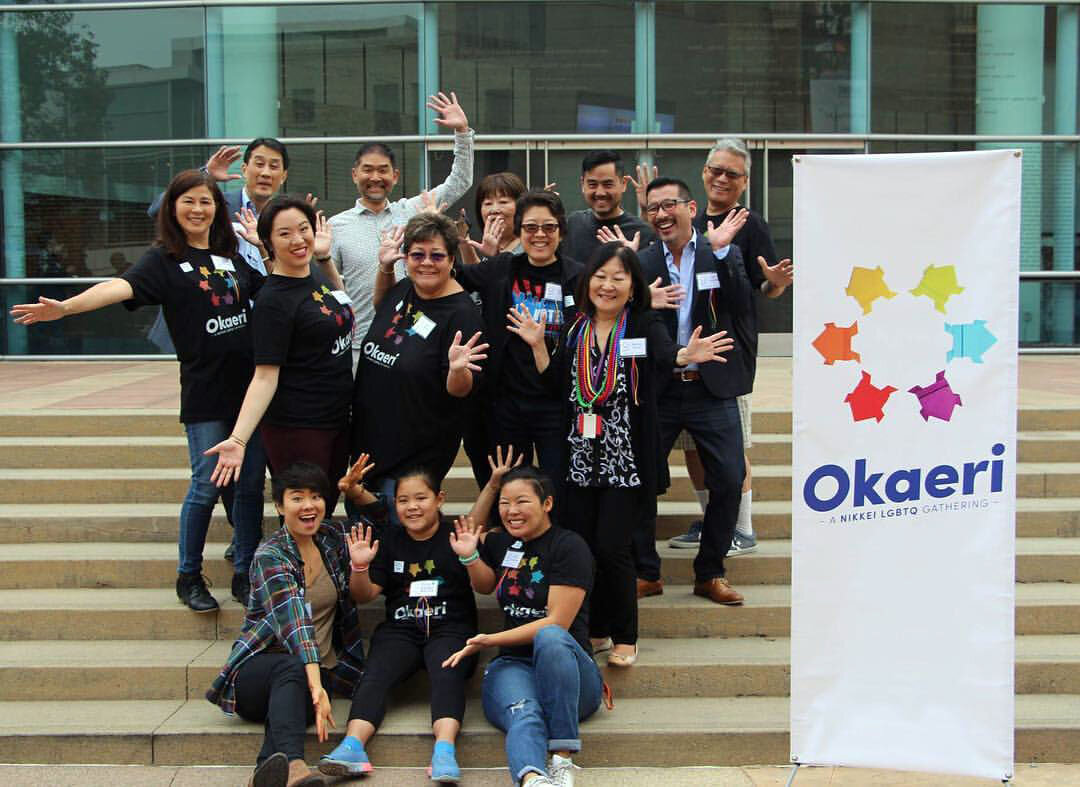June 22, 2021
Okaeri is a Los Angeles-based resource and support group whose mission is to create visibility, compassionate spaces, and transformation for LGBTQ+ Nikkei and their families by sharing our stories and providing culturally-rooted support, education, community-building, and advocacy. Okaeri Co-Chairs Stan Yogi, Marsha Aizumi, and Justin Kawaguchi joined Densho Communications and Public Engagement Director Natasha Varner for a Zoom call and subsequent email correspondence to tell us a little more about the work they do.
Natasha Varner: Tell us a little about Okaeri and how you all got organized.
Okaeri Co-chairs: In 2013, Marsha Aizumi, the mother of a transgender son, met with Bill Watanabe, a community leader in Los Angeles’s Little Tokyo, to discuss the lack of visibility and support for LGBTQ+ Japanese Americans. Bill suggested a conference for LGBTQ+ Nikkei, both to create a gathering space for queer-identified Japanese Americans and to raise awareness in the broader Nikkei community. Marsha put out a call for help to organize a conference, and about eighteen people responded. That group planned the first Okaeri conference, which was held in the fall of 2014. More than 200 people from across the country attended. Because the conference was successful and revealed a community need, subsequent conferences were held in 2016 and 2018.
NV: Why did you feel that it was important to document the oral histories of queer Nikkei in the Okaeri Voices project and how did you select the participants?
OC: LGBTQ+ Nikkei have been virtually invisible in Japanese American communities, let alone broader society. For many queer-identified Japanese Americans, Okaeri conferences were rare or first-time opportunities to meet other LGBTQ+ Nikkei. A group of gay Japanese American men over 40 started meeting in L.A. for potluck dinners after the first Okaeri conference. During those dinners, they lamented that when they grew up they were unaware of any older LGBTQ+ Japanese Americans. They wondered if they would have felt less isolated if they had known of even just one “out” Nisei or Issei. In 2017, one of the men who attended those potlucks advocated that Okaeri document the lives of older “out” Japanese Americans so that younger people and future generations could hear their stories of what it was like to be queer and Japanese Americans “back in the day.”
We invited four participants in Okaeri 2018 to be interviewed over the course of the conference for the first of the “Okaeri Voices” oral history videos. The following year, we secured funding to record four more oral histories. We aimed to interview people over 60 years of age who had a variety of experiences and grew up in different regions (the Midwest, Hawai’i, and Southern California).
NV: You brought several of the individuals you interviewed back together to have a conversation in the “Coming Out and Coming Home” virtual event in 2020. This seemed like such a powerful gathering, partly because it goes against this tendency to see recorded oral histories as static and singular media and instead created space for deeper conversation. What were some highlights or big takeaways from that virtual event?
OC: One of the big takeaways from that virtual event is that there are a variety of ways to come out. Each journey is unique and each individual has to find the courage to take risks to be true to themselves. A highlight of the event was hearing the presenters share advice they would give their younger selves. They spoke of how they would tell their younger selves that they are worthy of love and that they would find love. Because the panelists were honest and vulnerable, they touched audience members’ hearts and created greater compassion for the LGBTQ+ community.
NV: You go even further in using the oral histories as a basis for conversation by offering a very thought-provoking discussion guide that people can use alongside the recorded conversations and oral histories — what is your hope for how people use this discussion guide and the kinds of conversation it sparks?
OC: First, we hope that the “Coming Out, Coming Home” video and discussion guide will encourage straight Japanese Americans to openly acknowledge that LGBTQ+ Nikkei are part of the community. Many LGBTQ+ Japanese Americans have felt shamed, excluded or rejected by the Nikkei community. We sense that we have to hide our sexual orientation and gender identities to be accepted.
Second, we hope “Coming Out, Coming Home” will spark discussions about how Japanese American individuals and community organizations can support queer-identified Nikkei and make them feel seen, welcomed and valued for all of who we are, including our sexual orientations and gender identities.
Okaeri in Japanese means “welcome home.” So our goal is to transform the Nikkei community to be more compassionate and educated, so all LGBTQ+ Japanese Americans and their families feel safe, loved, at home, and connected to the Nikkei community.
NV: What’s next for Okaeri?
Okaeri’s next conference will take place Nov. 12-14, 2021. It will be virtual, which will make it easier for people from around the U.S., Canada and Japan to participate. Registration will be open August 31. In the meantime, Okaeri has ongoing English-language and Japanese-language discussion groups for LGBTQ+ identified Nikkei, family members and allies so that we can support each other and frankly discuss common challenges and celebrate our Nikkei and queer identities.
NV: How can people get involved or support your work?
Visit okaeri-losangeles.org and our social media (Instagram and Facebook) to learn about our programs. Sign up for our newsletter, so you’ll know about upcoming events. In addition, folks who don’t identify as LGBTQ+ can be supportive by having honest conversations with their LGBTQ+ family members, friends, co-workers, and neighbors about the challenges they face and the kind of support they’d appreciate. Finally, some people are not able or ready to attend events or feel comfortable talking about LGBTQ+ issues, but still want to be supportive. Donations of any amount are always welcome to support our programs and work.
